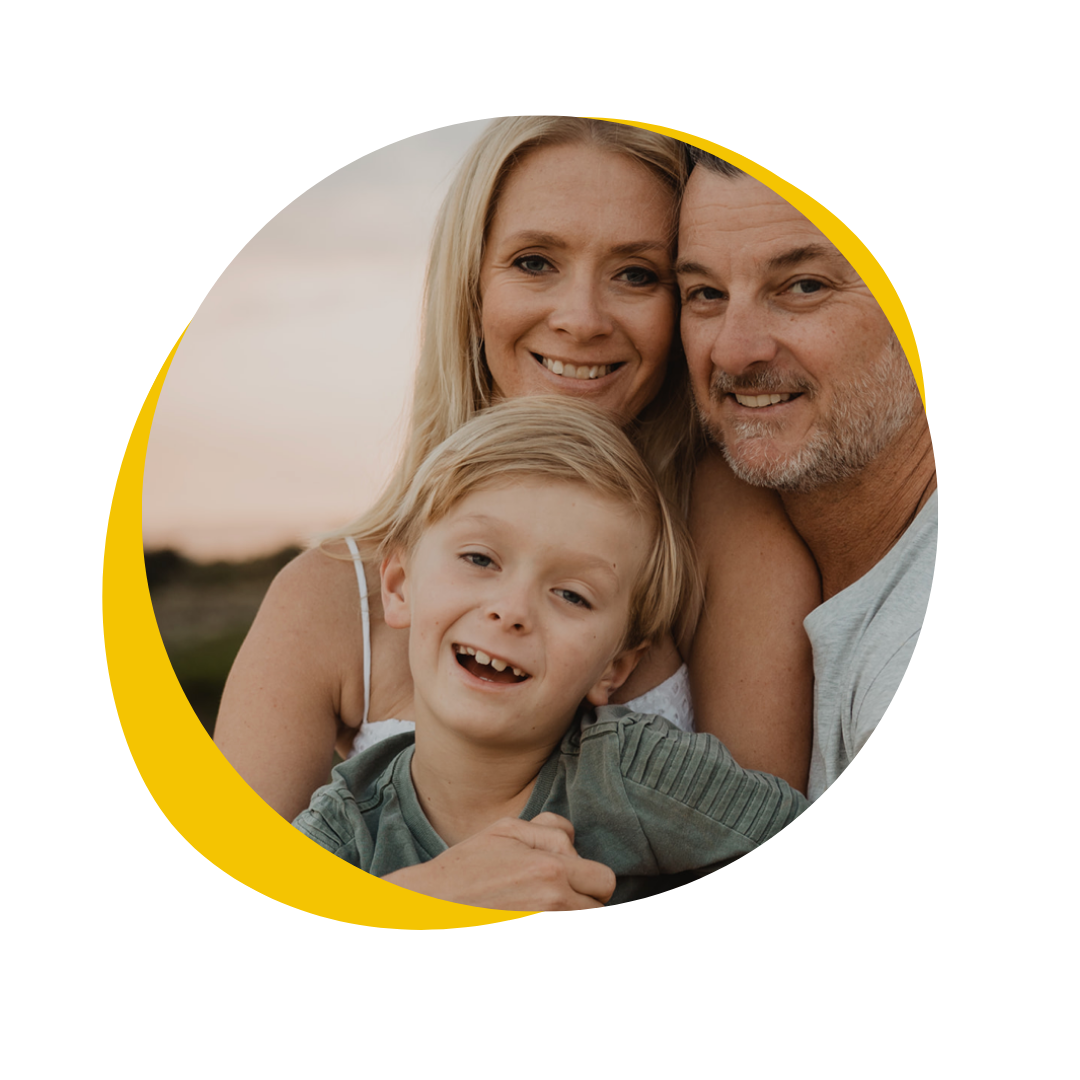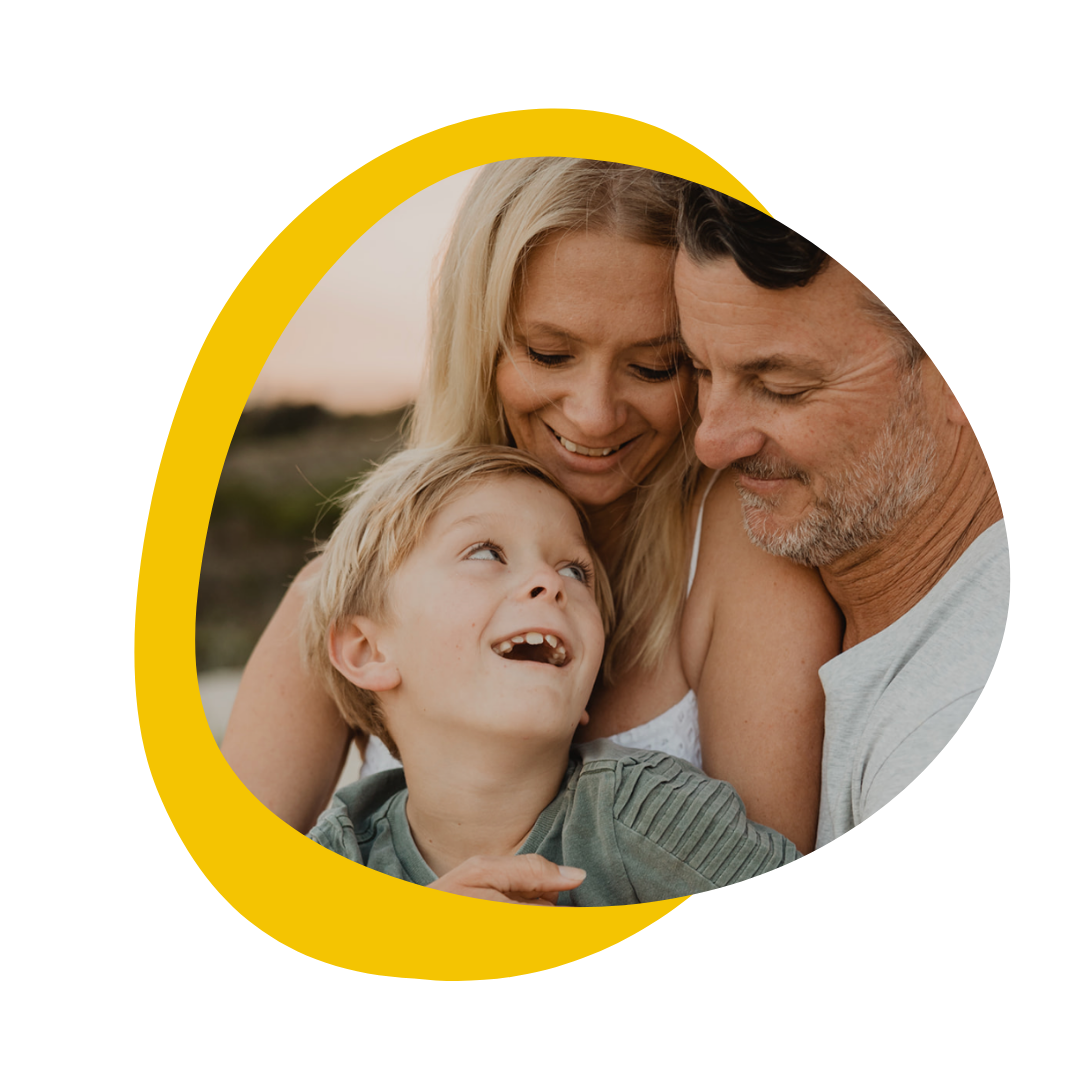
Ryley’s Story
Towards the summer school holidays of January 22, my husband and I took our 7-year-old son Ryley on a weekend away before school was due to return. During our little getaway, we noticed he was irritable, clumsy, and tired, having big day sleeps and not wanting to do normal ‘kid’ activities. On the final day, we noticed his right eye had turned in.
We thought he was just being silly at first, but it became worse and permanent.
The following morning, after we arrived home, I took him to the optometrist, thinking he might need glasses. Within minutes of the appointment, I was handed a letter and told to go straight to the ED of our local hospital.
When the triage nurse took one look at his eyes, they rushed us through. From then on, our nightmare began. Doctor after doctor, test after test. Stares and whispers. Our son was rushed through for an emergency MRI. My husband went in with him. I sat in the corridor crying. What was going on? I felt like I was in a bad movie.
‘Your son has a brain tumour. Tomorrow morning, you will be taken to Queensland Children’s Hospital to meet the head of Paediatric Oncology.’
That night, my husband and I reassured each other that it was going to be okay. They will operate. He will do chemo. We will sell everything. We will do everything we can for our son.
The next day, we were taken into a small room. The oncologist was to the point.
Your son has DIPG.
He will die in 6-12 months.
There is nothing we can do.
It cannot be operated on because of where it is located.
Chemo does not work.
There are no effective treatments.
We will start 30 days of palliative radiation immediately. This may or may not buy him extra time.
We suggest you go home and make memories.
I feel sick thinking about it.




At the time of Ryley’s diagnosis, there were no trials available in Australia, so we decided not to take the chance of risking a biopsy. My beautiful boy bravely (although he hated every second of it) completed the 30 days of radiation.
He was one of the lucky ones. It shrunk his tumour by nearly half, and slowly my cheeky boy came back to us. He had no disabilities, and his eye and facial drop had rectified themselves. We had hope again, false hope… as it didn’t last long.
After Ryley completed the radiation, I became a part of a parent’s group with children suffering from DIPG. With the support of these amazing parents and lots of googling, we learnt about a drug called ONC-201 from Germany. We also became aware of Professor Matt Dun in Newcastle, who had lived our nightmare. Professor Dun had been researching ONC-201 after the death of his own daughter to DIPG. He had compared the German version with the trial version out of the U.S. They were the same, and as we were not able to enrol for the trial in the US, we started buying the drug and importing it into Australia.
Ryley took the drugs for 6 months before progression began. In this time, we lived life as best we could, knowing our son would soon die. We jammed a lifetime into 7 months. USA and Disneyland, of course, cruises, snow trips, camping, sleepovers, parties, many visits to time zones, build a bear and his favourite eateries and loads of Lego.
One day, he quietly said to me, ‘Mummy, my head has been hurting for a few days – kind of like a headache in the back of my head’. I froze; the pain (like venom) that passed through my body nearly crippled me. I knew this was it; my boy was going to change forever, and I would soon lose him.
About a month later, Ryley began his second round of radiation. 17 sessions this time. Telling him he would have to do it again was horrific. No parent should have to watch their child’s head be pinned to a hard board by a full-face mask, then walk out of the room and leave them alone whilst they cry and beg for you not to leave. All while knowing this time, it may only give him 1-2 months of quality life. I am shaking and crying as I remember these days.
The radiation helped a little this time, and as predicted, some of his symptoms were relieved, but Ryley never returned to his normal self. The high dose of steroids had completely changed his appearance, and he now weighed double his normal weight.
We also decided to try the only trial available to us at the time, which was ACT 001. I wish I could say it helped, but it didn’t. Not a bit. Do I wish I had never put him through the trial and taken the medication – yes, but if we didn’t try, would I live with regret and wonder that he could have been one of the lucky few who have responded?
As a family, we had some nice times throughout those couple of months, and thankfully, we have the memories of Christmas and his 8th Birthday. It breaks me that he thought he would get better like last time. I had lost hope, but he still had it.
After Christmas, my sweet, active, cheeky, funny little boy began to be tortured by the deadly tumour growing in his brain. Over the next few months, he lost the ability to walk, the use of his right side, balance, speech, eyesight, the ability to hold his body and head up, his left side, his ability to swallow solids, then liquids, and finally, he lost his ability to breathe. Slowly it stole every ability from him yet left his mind cognitively intact. He knew everything that was happening to him and was completely trapped in his body. I hate DIPG.
What did you know of DIPG pre diagnosis?
We knew nothing of DIPG. We had never heard of it before Ryley’s diagnosis.
Were there any early signs?
When I think of any early signs of DIPG, in hindsight, his mood and behaviour had been off for a few months. He was not playing well with other kids and was very irritable. Ryley was not doing well at school during the previous six months prior to his diagnosis. He was zoning out in the classroom and not asking for help. He was also not participating like his usual self in after-school activities. Ryley was treated at QCH. We also had the support of GCUH. I used Google, Parents support advice and experiences, and Facebook research pages. I emailed doctors, had Zoom meetings and sent scans of Ryley’s MRIs all over the world for advice.
Support Received
My mother, Lindy Baxter, was our rock. She was there for us in every way possible.
We had amazing friends who set up a ‘GoFundMe’ page. This allowed us to buy the drugs from Germany and give Ryley everything we could. Another group of friends also organised a golf day to raise money for Ryley.
The Starlight Foundation gifted us an amazing week on Hamilton Island.
We had wonderful support, monetary gift cards, and getaways, which were gifted by Red Kite, Brainchild, and Camp Quality.
GC Suns were brilliant and gave Ryley some amazing experiences – they were a big support for the entire family.
Professor Matt Dun – his professionalism, advice, and understanding as a grieving father.
The Australian DIPG Community.
The most beautiful, caring nurse practitioner from GCUH, Michelle Noyes.
How was RUN DIPG involved?
I contacted RUN DIPG within the first few weeks of Ryley’s diagnosis. I was given support and advice that I could not find through our own medical team.
After Ryley’s passing, RUN DIPG saved my life. The charity has given me a purpose, and reason to keep living. To see firsthand the incredible research work Professor Matt Dun and his team do at the Dun Lab at the University of Newcastle – where my brave boy continues to fight for other children, gives me the strength to keep fighting.
The Charity team is unwavering in their pursuit of promoting awareness and raising funds to support the research so desperately needed not only in Australia but globally. They have welcomed me to their events as a guest and as a volunteer. They have also created events in Ryley’s honour.
What does DMG/DIPG research mean to you?
Research is vital! A family should never be told to ‘go home and make memories’ without any plan or any hope. We must support our world-class scientists and researchers in finding treatment options and, ultimately, a cure. My hope is that in the coming years, families will be given a standard of care that exceeds palliative radiation.
Support for DIPG Parents
For support from a group of Australian mothers who have lost their children to DIPG or are still in the fight, please email us at [email protected].
To be part of an Australian DIPG Facebook group, please join ‘DIPG Aussie Kids and Families’.
Words for Ryley’s story were provided by Beau Kemp.

BROADBEACH STATE PRIMARY SCHOOL
Ryley was a proud student at Broadbeach State School – ‘The little school by the beach’.
He completed Prep and grade 1 and was so excited yet nervous about starting grade 2. Unfortunately, and shockingly, he was diagnosed with DIPG toward the end of the 2022 summer school holidays and never felt confident or able to start grade 2.
The school was amazing and supported us in every decision we made. In memory of Ryley, they held a beautiful day on the oval at the end of 2023, ‘Remembering Ryley’, which coincided with the release of the GC Suns School program #39 Reasons.
The day was magical and a huge success, raising funds for much-needed DIPG research. Most of all, our beautiful boy was remembered by all his peers, teachers and the community.
GOLD COAST SUNS
During Ryley’s battle, he had a very special connection with the Gold Coast Suns AFL club. They welcomed him as team member, signed a contract (for the day) and was allocated number #39, which he has now held for 3 years. Ryley’s name is still prominent in the boys locker room.
The Suns were incredibly supportive and welcomed us into the club – we became part of the family. This was the first and only club Ryley was a part of, and it gave him incredible strength and acceptance throughout his journey with DIPG.
We are forever grateful to the GC Suns and their continued support after our son’s passing. They have developed a school program currently being rolled out throughout QLD primary school, named #39 Reasons. The program focuses on the difference empathy can make. We are honoured to be a part of this initiative.

